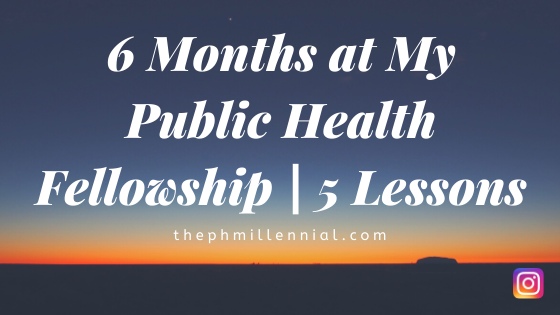The first 6 months of my public health fellowship has been a whirlwind of feelings and experiences. From feeling like I was way in over my head, to not understanding what was going on in meetings, to finally being able to own my position.
When starting a new job, especially when transitioning from student to a full-time position, there are many obstacles that can come up with your new experiences.
When I started my public health fellowship in June of 2019, I was certainly thrown into the thick of things. From day 1, I came into work hitting the ground running.
By being thrown right into the deep end when I began my public health fellowship. As I am able to reflect on my first 6 months, I wanted to share 5 lessons I’ve learnt.
Support The Public Health Millennial on BuyMeACoffee
(Related: Why I Wanted A Fellowship)
Reflection Of My First 6 Months
Though I have lived in vastly different countries, i.e. Trinidad and Tobago, The Sultanate of Oman, and now USA (Florida and now Alaska), this was the first time that I have made the transition completely by myself. I did move to Tampa to do my undergraduate by myself, but you have many resources such as other students, counselors, etc. that help with the transition.
Up until now I was somewhat dependent on my family for something. Whether that was food, car insurance, or rent.
I remember my first week of my public health fellowship so vividly, although it surely flew by quickly. From orientation training the first day to hearing what all my coworkers loved about the Mat-Su Valley in Alaska in my first staff meeting.
Though they would like you to think the first week, or two, was an introductory grace period – it was filled with a whole lot of learning and figuring out my position.
(Related: What I Do in My Fellowship)
5 Lessons Learnt
Live and Die By Deadlines
As you step into the professional world, it is going to be similar to school life with the deadlines you have to complete.
Not only do you have deadlines to complete projects, but I suggest you set personal deadlines. In my first 6 months, I have been given many different projects and been pulled in to help with many others.
At first it was overwhelming to know how to best use my time to do my best work on each project. To add to this, there are many meetings and other obligations that come up that eat away at my time during the workdays.
So I had to figure out what worked best for me to ensure that I am producing the quality of work that I know I am capable of. This consisted of a few tried and failed techniques – but then I developed a method.
What works for me
The first part of the method is obviously to write down all the task I had to do along with when I had to have them completed. Then I would prioritize task by the amount of time I think it would take to complete. And I’d add about 20-25% more time than I think it would take to complete as a buffer.
Then I’d categorize task by daily, weekly, and other.
Daily means that I have to do some component of the project today. Weekly represents what I have to do for the week and as daily task get completed weekly task then shift into my daily plans. Other just represents the task that don’t have a deadline or are at the bottom of my prioritization list.
This method has allowed me to continually stay on top of task even when knew projects come up out of the blue.
(Related: Why You Need These 3 Hobbies in Life)

Use Time Wisely
Whether you are a student, starting a new internship or starting a new job or public health fellowship, it is always important to use your time wisely.
One of the biggest challenges when starting a new position is determining how to use your time wisely. You will want to maximize the amount of productivity you get out of your time.
So my office has an open door policy. If your door is open then coworkers are free to come in, but if your door is closed then your busy. I didn’t figure this out until maybe a month into my fellowship, but boy did this help me.
So I would advise that you find out about these sorts of norms or unofficial rules where you work. There is too much good work that is lost from small distractions. People stepping into your office. Having to attend a meeting. Having to take a call. Or just general Phone notifications.
It is best you try to avoid these distractions. This will help you get into your flow state and allow for deep work.
What works for me
I think it’s important especially as a new employee, that you ease into your new environment. No one likes someone that comes in and demands things go how they like it. Learn what works at your office and with your coworkers.
I learnt that having my door closed allowed me to decrease the amount of distractions I had on a daily basis. Therefore I used the close door policy to enhance the time I had to get work done. In addition, I would put a hold on my calendar with the project I was working on when I did close my door. This ensured that my coworkers knew what I was working on if they so desired. Also this showed them when I would be free during the day to chat.
Another thing that I have learnt to maximize the use of my time is: work on important projects on Fridays. In my office, Fridays are the quietest day of the week since people work from home or are off on most Fridays. Therefore, I use this to my advantage and try to get most of my work done on this day.
Importance of Notes
If you are in public health, acronyms are something that you are going to have to get to know. To make it worst, every state calls different things differently and they are going to have many new organizations in each state. This definitely provides you with a fair share of challenges if you are moving from state to state. Or at least you’ll need a grace period to be acclimated to the new public health environment.
With that being said, communication is going to be a skill that you are on point on from day one. From learning your coworkers names to understanding acronyms and what each organization does. Communication is going to play a huge part in this.
I had to learn the professional preferences of my coworkers. This helped me to better work with each person individually . And by respecting their work style, it makes it more apt for them to learn and accept your working style.
What works for me
The first thing I did at my fellowship was to start writing down everyones name. Thankfully, part of my orientation was sitting down and speaking to everyone at the office for at least 30 minutes in the first week. I ensured to take my notebook with me and wow how this was beneficial.
This was beneficial in 3 ways:
- Learnt coworkers names easier and about their professional history and families
- Got insights into how the organization works and the role of the different employees
- Learnt about projects currently being worked on and how other organizations work in our public health environment
6 months later I can sit down here and say I recall all that information. Just because I wrote it down when I first started.
The second thing I did was write down all the terms (acronyms or others) that were unfamiliar to me. I did this so that I could look it up afterwards.
And the third thing I wrote down was peoples names and roles in meetings I attended with them. I had so many meetings within my first month, remembering and matching names was difficulty. Especially given stakeholders we are working with on other projects have the same names.
By writing down everything I was able to learn and retain information. I enabled myself to have an upper hand in solidifying the vast amount of knowledge thrown at me as I began my new role..

Communication is Key
I’ll start this by saying when you are starting a new role, there is no such thing as over-communicating. No employer expects you to know everything about your role in the first couple weeks. I was even told that it takes a Program Officer around a year to totally understand their role. This information made me a lot more comfortable in my role.
One of my biggest lessons in communication was during my MPH program while I was doing one of my internships.
After completing and presenting my research at the Florida Rural Health Association Conference, I learnt from the CEO of my other internship site that I analyzed the data incorrectly. Therefore I would have to do it all over – boy was this frustrating. If I had asked for someone to review what I was doing before I was completely finished, we would have more than likely seen the mistake.
Knowing this, I wanted communication to be at the forefront of how I approached my new public health fellowship.
What works for me
I always get clarification on what I’m suppose to be working on. I also always ensure that I am prioritizing my work by importance seen by my supervisor. So if a new unexpected project comes up and it will take lots of my time – I ensure to ask my supervisor what I should prioritize and work on.
I think its important, especially for you first couple months, that you ensure you are doing your best work so that you are able to seamlessly transition into your new role.
So when I was starting to work on a project, maybe I forgot what exactly I had to do or all the components necessary (mostly cause I didn’t write it down), I would always start off the project and go and ensure this is what my supervisor was looking for. Although, I was doing the right thing the majority of the time, this allowed my supervisor to know that I am open to communicating even when I’m not sure of an objective.
Ask questions when you don’t know. The last thing you want to do in a new role is to finish a project and learn that you did the entire thing wrong. Seek out communication channels that make your work easier and keeps you on track.

Good and Bad Meetings
In undergraduate, I didn’t mind meetings but I never really gave much thought of good and bad meetings. In graduate school, I started to get a senes for what made for a good meeting and what made for a bad one. And in my public health fellowship, I was able to learn how to best hone my meeting skills.
After reading the 4-hour workweek a couple of months ago, this changed my perspective on how we perceive work. A thing that stood out to me was maximizing your time and productivity in meetings.
In the book, Timothy Ferris states that meetings should only be held to make decisions about predefined situations and not to define a problem. This stood out to me, because how many meetings do we go to where there is no preset agenda or any real plan to address an issue. Meetings should not be held for the sake of holding meetings.
When having a meeting, ensure you:
- Define the problem. Whats the ultimate reason for having the meeting?
- Plan the meeting. What specifics around the problem do you want to talk about?
- Set an action plan. When the meeting is done, what will all parties have to do?
You will have to discern which meetings are good from the bad, and try to avoid the bad meetings. I have learnt that my time can be used more wisely somewhere else and I can always be updated on what occurred in the meeting afterwards.
Some meetings can be substituted by a phone call or an email. Ensure if you are going to a meeting, that it has a defined purpose.
Also, if you are attending a meeting, always request to have an agenda ahead of time. This will allow you to prepare your thoughts to have a productive meeting. On the other hand, always send out an agenda before you host a meeting.
What works for me
When I started my public health fellowship, I had to attend a lot of meetings. This helped me to learn which meetings were most impactful. And also how much time I ideally need for specific meetings going forward.
I would never call a meeting if I haven’t determined the problem or issue that needed to be solved. I also would not call a meeting without having planned to send out an agenda beforehand.
It is annoying when someone plans a meeting and it goes over time. Especially when I had planned to use that time for a specific task I wanted to complete. Thus I learnt for my meetings that you should calculate how long you estimate you’ll discuss each agenda bullet point then add buffer time onto the total.
So if I estimate the meeting would take 30 minutes, I add 15 minutes buffer time. Thus setting the meeting for 45 minutes. Similarly, if I estimate the meeting would take 1 hour 30 minutes, I add 30 minutes buffer time. Thus making the meeting 2 hours long. This is a great way to never go over the amount of time you had set a meeting for.
Another thing that I do in meetings I lead is if something isn’t being solved with one or a couple parties, then I tell them to bring it back up to me afterwards. This ensures you are cognizant of everyone’s time, which people truly do appreciate. Also if your meeting goes according to plan and ends within your estimated time, then you’ve saved your colleagues some time in their days which they will also appreciate.
Bonus Lesson
Setup an evaluation process.
Whether you’re in an internship, a new job or a fellowship, you should ensure to set up an evaluation process. You can set this up with be your supervisor or by yourself.
I learnt how important having an evaluation process can be for doing your best work. This process allows you to know exactly what you have to accomplish during your time in a specific position. It allows you to evaluate how successful you have been in completing projects and task you work on.
If you are setting up an evaluation process on your own. Ensure the goals or objectives are S.M.A.R.T. and get you towards the skills you need.
(Related: How To Set Up An Effective LinkedIn Profile)

Conclusion
In concluding, the last 6 months of my fellowship has been a great experience where I have learnt a lot and grown immensely.
These are the 5 takeaways that have made the most impact for me during my public health fellowship journey:
- Live and Die by Deadlines
- Use Time Wisely
- Importance of Notes
- Communication is Key
- Good and Bad Meetings
- Bonus Lesson: Evaluation
Though everyone’s experience is going to be different, it is important we make the most out what opportunities we are given. By using these 5 lessons, you can better enable yourself to grow and learn in your new position.
What are your biggest takeaways from my first 6 months in my public health fellowship?



